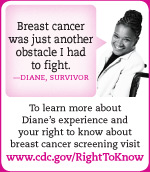Types of Disabilities
 There are many types of disabilities, such as those that affect a person’s:
There are many types of disabilities, such as those that affect a person’s:
- Hearing
- Vision
- Movement
- Thinking
- Remembering
- Learning
- Communicating
- Mental health
- Social relationships
Disabilities can affect people in different ways, even when one person has the same type of disability as another person. Some disabilities may be hidden or not easy to see.
Anyone can have a disability and a disability can occur at any point in a person’s life, such as:
- An infant can be born with spina bifida, which may affect walking.
- A child could be in a car crash and have traumatic brain injury, which may affect thinking and remembering.
- A young adult can have depression or another mental illness, which may make it difficult to manage day-to-day stressful situations.
- A woman in early midlife can develop multiple sclerosis, which may make it difficult to move around.
- A college student with epilepsy whose seizures are stimulated by stress may need accommodations with activities such as long tests.
- A man in late midlife can develop hearing loss, which may affect how he communicates.
- An older adult can lose eyesight from glaucoma.
International Classification of Functioning, Disability and Health
The World Health Organization (WHO) has published the International Classification of Functioning, Disability and Health (ICF) in 2001. The ICF provides a standard language for classifying changes in body function and structure, activity, participation levels, and environmental factors that influence health. This helps to assess the health, functioning, activities, and factors in the environment that either help or create barriers for people to fully participate in society.
The ICF parts are presented here in modified form for easier reading. For more information, please visit the WHO website.
The following links provide information from CDC's National Center on Birth Defects and Developmental Disabilities on certain disability-related health conditions:
- Attention-Deficit / Hyperactivity Disorder (ADHD)
- Autism
- Cerebral Palsy
- Deep Vein Thrombosis (DVT) (Blood Clots)
- Duchenne/Becker Muscular Dystrophy
- Fetal Alcohol Spectrum Disorders (FASD)
- Fragile X Syndrome
- Hearing Loss
- Hemochromatosis (Iron Overload)
- Hemophilia
- Intellectual Disability
- Kernicterus
- Paralysis
- Sickle Cell Disease
- Spina Bifida
- Spinal Cord Injury
- Thalassemia
- Tourette Syndrome
- Traumatic Brain Injury
- Vision Impairment
- Von Willebrand Disease
Health Conditions
This term refers to illness, disease, disorder, injury or trauma. The condition is usually a diagnosis. For example, autism spectrum disorders, spina bifida, and traumatic brain injury are health conditions.
Body Structures
Body structures are physical parts of the body. For example, heart, legs, and eyes are body structures.
Body Functions
Body functions describe how body parts and systems work. For example, thinking, hearing, and digesting food are body functions.
Functional Limitations
Functional limitations are difficulties completing a variety of basic or complex activities that are associated with a health problem. For example, vision loss, hearing loss, and inability to move one’s legs are functional limitations.
Activity
Activity means doing a task or action. For example, eating, writing, and walking are activities.
Activity Limitations
Activity limitations are difficulties a person may have in doing activities. For example, not being able to brush one’s teeth or open a medicine bottle are activity limitations.
Participation
Participation means being involved in a life situation and fully participating in society. For example, attending school and playing sports. This also means including people with disabilities in all aspects of a communities’ political, social, economic and cultural life.
Participation Restrictions
Participation restrictions are problems a person may have in life situations.
Environmental Factors
Environmental factors are things in the environment that affect a person’s life. For example, technology, support and relationships, services, policies, and the beliefs of others are environmental factors.
Personal Factors
Personal factors relate to the person, such as age, gender, social status, and life experiences.
Contact Us:
- Centers for Disease Control and Prevention
National Center on Birth Defects and Developmental Disabilities
Division of Human Development and Disability
1600 Clifton Road
MS E-88
Atlanta, GA 30333 - 800-CDC-INFO
(800-232-4636)
TTY: (888) 232-6348
New Hours of Operation
8am-8pm ET/Monday-Friday
Closed Holidays - cdcinfo@cdc.gov



